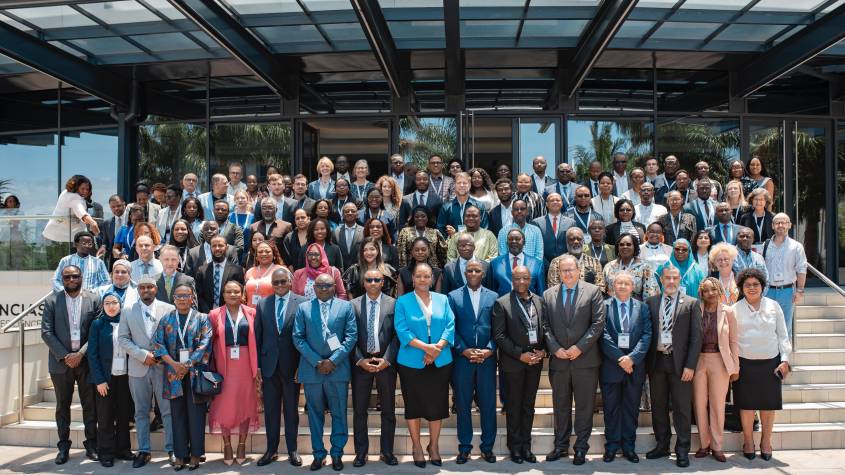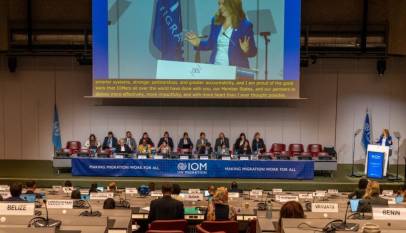AMRH: Towards Strengthened, Harmonised African Medicines Regulatory Systems
The 4th African Medicines Regulatory Harmonization (AMRH) Week, organized by the Africa Medicines Regulatory Harmonisation (AMRH) Joint Secretariat – comprising the African Union Development Agency-NEPAD (AUDA-NEPAD) and the World Health Organisation (WHO) was held recently in Maputo, Mozambique, marking 15 years of efforts to harmonize and strengthen Africa’s pharmaceutical regulatory systems.

The World Health Organization (WHO) identifies Antibiotic Resistance (AMR) as one of the greatest threats to global health, food security, and sustainable development. Key factors contributing to antimicrobial resistance include the misuse and overuse of antibiotics, limited access to quality and affordable medicines, vaccines, and diagnostics as well as the circulation of falsified and substandard (SF) antibiotics.
Themed: “15 years of African Medicines Regulatory Harmonization[AMRH] as a foundation for AMA [Africa Medicines Agency]”, the milestone biennial event celebrates the progress made over the past decade and a half in strengthening medicines regulatory systems on the continent. The event convened African leaders, policymakers, Regional Economic Communities (RECs), members of AMRH Technical Committees (AMRH TCs), and various stakeholders from national governments and private sector entities.
Among others, the objectives of the 4th AMRH Week was to showcase the AMRH TCs’ success stories, best practices and lessons learnt; Adoption of strategies for medium to long-term priorities and interventions in the prevention, detection, and response to substandard and falsified medical products on the continent; Launch of the AMRH information management systems as well as strengthening partnerships for collective action ahead of the operationalization of the African Medicines Agency (AMA).
Key activities at the weeklong commemoration included meetings on Good Manufacturing Practices (GMP); Medicines Policy and Regulatory Reforms (MPRR), and the Evaluation of Medicinal Products (EMP) as well as the Annual 11 Regional Centres of Regulatory Excellence (RCOREs) Meeting. The climax of the event was the African Medicines Regulators Conference (AMRC), a convening of heads of National Regulatory Authorities (NRAs) and other high-level stakeholders focused on regulatory capacity development, among others.
Highlight of the discussions were the operationalization of the African Medicines Agency (AMA); How Africa can combat substandard and falsified medical products, enhancing and harmonizing regulatory standards and fostering partnerships to build resilient health systems in Africa. In addition to celebrating Africa’s medicines regulatory successes, 2024 AMRH Week also delved on crucial challenges and future priorities for addressing substandard medical products and strengthening local pharmaceutical production capacity.
“Harmonization, Collaboration Crucial to Combatting Fake, Substandard Medical Products”
In her statement, Dr. Tumi Semete-Makokotlela, CEO of South African Health Products Regulatory Authority (SAHPRA) and Chair of the AMRH Steering Committee, highlighted the importance of collaboration and harmonization of regulatory efforts among African countries, pointing out that the 15-year-old collaboration among Africa’s National Regulatory Agencies (NRAs) under AMRH has led to significant progress.
“While we have done an excellent job and have achieved significant strides, the road before us is long. The benefits of our efforts do not only accrue to us as a community, rather they accrue to the general public in our respective countries. They accrue to the pharmaceutical industry that is burgeoning, an industry that is growing, an industry that is looking forward to locally manufactured products,” she said.
The SAHPRA CEO said the AMRH Initiative had over the last 15 years remain action-oriented and commended the various AMRH Technical Committees and technical teams for their commitment and productivity. As a result, she said African regulators were being recognized for their exemplary work globally and therefore encouraged her colleagues to remain steadfast in the fight against substandard products that threaten public health across the continent.
“Africa CDC Committed to Boosting Local Vaccine Manufacturing Capacity”
In his statement, Dr. Abebe Genetu, Acting Coordinator for Platform for Harmonized African Health Products Manufacturing (PHAPM) at Africa CDC, emphasized the need to strengthen Africa’s medicines regulatory landscape so as to improve the accessibility and quality of medicines in Africa, underscoring the urgency for improved local vaccine manufacturing capacity in Africa towards enhanced pandemic preparedness and resilience.
“Africa CDC is dedicated to supporting and fostering collaboration among African pharmaceutical manufacturers so as to strengthen the medicines regulatory ecosystem in Africa. We are currently battling with two major outbreaks on the continent. The response is jointly led by Africa CDC and WHO in collaboration with global partners. We have conducted an analysis of the vaccine manufacturing landscape in Africa which shows there are 25 vaccine manufacturing initiatives. Between 2025 and 2030, three of these manufacturers are expected to secure WHO prequalification,” he said.
Dr Genetu said the 37th ordinary session of the AU assembly had mandated Africa CDC to establish a continental pooled procurement mechanism. “This underscores the commitment of our leaders in promoting local manufacturing of health products in Africa. The African Pooled Procurement Mechanism (APPM) seeks to consolidate demand, negotiate better prices and secure a consistent supply of quality medicines and health products to our Member States. This alignment between regulatory and procurement mechanisms is critical for establishing trust and efficiency within the African healthcare system.”
“AMRH Initiative overcoming regulatory obstacles, providing access to safe medical products.”
In his remarks, Mr. Symerre Grey-Johnson, Director of Human Capital and Institutional Development at AUDA-NEPAD, highlighted the critical role of the AMRH initiative in advancing the continent’s healthcare landscape. Since its inception, he said, the initiative has made significant strides in overcoming regulatory obstacles, providing African citizens with access to safe and high-quality medical products.
Key achievements include the attainment of Maturity Level (ML3) status by six National Regulatory Authorities (NRAs), aligning Africa with global regulatory standards and fostering growth of the local pharmaceutical industry. He underlined the growing support for the African Medicines Agency (AMA) treaty by AU Member States with countries like Congo, Zambia, and Tanzania having already ratified the treaty.
“Our collective progress is reflected in the recent achievement of ML3 status by six National Regulatory Authorities (NRAs). This accomplishment showcases Africa’s commitment to regulated systems in line with global standards, confirming that we are on the right path. The support for African Medicines Agency (AMA) through committed actions from AU Member States is evident in more nations ratifying the AMA treaty which is strengthening the momentum for realizing AMA’s vision,” he noted.
Mr Grey-Johnson said one of AMRH initiative’s significant milestones is the continental pilot listing of human medical products, which he said tests and validates continental processes, involving Evaluation of Medicinal Products Technical Committee (EMP-TC) and Good Manufacturing Practices Technical Committee (GMP-TC). He said, by promoting work-sharing and reliance models, the AMRH initiative is identifying regulatory gaps and enhancing Africa’s health systems.
“A streamlined, reliable regulatory information-sharing system is essential. Therefore, AMRH is developing the Regulatory Information Sharing Portal (RISP) to connect NRAs and Regional Economic Communities (RECs) for effective collaboration and harmonization of health regulations. The RISP will be the cornerstone for building a unified and resilient health regulatory framework across the continent,” Grey-Johnson stated.
WHO Director Advocates for Sustainable Systems Against Substandard Medical Products in Africa
In his remarks, Dr. Rogerio Gaspar, Director of WHO’s Regulation and Prequalification Department, highlighted the importance of combating substandard and falsified (SF) medical products in Africa, emphasizing the progress toward improved regulatory system integration and the attainment of Universal Health Coverage in Africa, post-COVID pandemic.
He descried the fact that only 50% of the world’s population is covered by comprehensive health regulatory systems, underscoring the need to combat substandard and falsified (SF) medical products and acknowledging the fact that achieving this requires strong and sustainable regulatory systems, including boosting local pharmaceutical manufacturing. He nonetheless expressed WHO’s commitment to supporting African countries through initiatives like prequalification for pharmaceutical manufacturers
“The COVID-19 pandemic exposed African countries’ vulnerability to SF items like gloves and self-test kits. Therefore, it is essential that we maintain focus across all medical product categories. Climate-resilient and environmentally sustainable supply chains are also imperative. The push for local production is impressive but has to be approached with caution as local production isn’t a cure-all; regulatory diligence is still crucial to ensure quality. “
Dr Gaspar said Africa has the opportunity to connect the fights against SF products with that against Antimicrobial Resistance (AMR) through the OneHealth approach, which collectively address human, animal, and environmental health, reiterating the role of AI in improving healthcare access. “AI and machine learning are revolutionizing regulatory processes but this poses new challenges for regulatory authorities, particularly with industry innovations like AI-generated clinical data,” he warned.
The AMRH Journey: Successes, Challenges
The 4th AMRH Week celebrated 15 years of progress in strengthening Africa’s medicine regulatory systems, emphasizing collaboration and innovation to combat substandard medicines. Key achievements include the attainment of Maturity Level 3 by several national regulatory bodies and increasing support for the African Medicines Agency. As Africa advances in building resilient health systems, the insights from AMRH Week will guide future efforts.
Since its inception in 2018 the AMRH Week has continued to serve as a key platform for medicine stakeholders to reflect on the successes and challenges of the AMRH Initiative. This year’s event focused on lessons learned over the last 15 years of the AMRH Initiative and explored strategies for improving regulatory systems so as to combat substandard and falsified medicines in Africa. Notably, the event features the launch of AMRH’s new Information Management Systems (IMS) aimed at improving regulatory coordination across the continent.
Moreover, the AMRH Week has played a pivotal role in advancing Africa’s regulatory efforts, including the implementation of global standards and the push for local vaccine manufacturing. As African countries continue to align their regulatory frameworks with international standards, the event underscored the importance of collaboration among regulatory authorities, WHO, and other global health bodies in tackling these issues and ensuring sustainable access to essential medicines for all African citizens.














